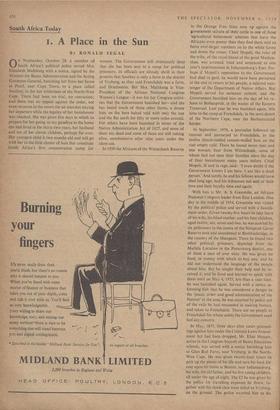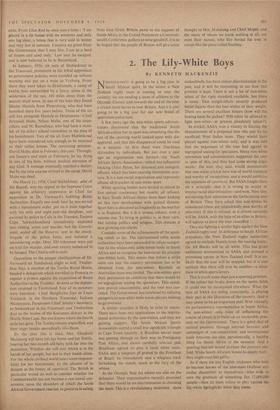South Africa Today
i. A Place in the Sun
By RONALD SEGAL
ON Wednesday, October 28, a member of South Africa's political police served Mrs. Elizabeth Mafekeng with a notice, signed by the Minister for Bantu Administration and the Acting Governor-General, banishing her from her home at Paarl, near Cape Town, to a place called Southey, in the hot wilderness of the North-West Cape. There had been no trial, no conviction; and there was no appeal against the order, not even recourse to the courts for an interdict staying her departure while the legality of her banishment was checked. She was given five days in which to prepare for her going, to say goodbye to the home she had lived in for thirty-two years, her husband and ten of her eleven children, perhaps for ever. Her youngest child is two months old and will go with her to the little cluster of huts that constitute South Africa's first concentration camp for
women. The Government will strenuously deny that she has been sent to a camp for political prisoners; its officials are already shrill in their protests that Southey is only a farm in the district of Vryburg, as they said Frenchdale was a farm, and Driefontein. But Mrs. Mafekeng is Vice- President of the African National Congress Women's League—it was for her Congress activi- ties that the Government banished her—and she has heard much of those other farms, a dozen huts on the bare baked veld with only the sun and the flat earth for fifty or more miles around. For others have been banished in terms of the Native Administration Act of 1927, and some of them are dead and some of them are still rotting alive, unsubmissive after nine years under the silent sun.
In 1950 the Africans of the Witzieshoek Reserve
in the Orange Free State rose up against the government seizure of their cattle in one of those
`agricultural betterment' schemes that leave the Africans even poorer than they find them and so force ever-larger numbers on to the white farms and down the mines. Chief Mopeli, the ruler of the tribe, of the royal blood of the great NI oshoc- shoe, was arrested, tried and sentenced to one year's imprisonment in Johannesburg's Fort. Per- haps if Mopeli's opposition to the Government had died in gaol, he would have been permitted at the end to return to his people, a salaried mes- senger of the Department of Native Affairs. But Mopeli- served his sentence unbent; and the Government banished him on the day of his re- lease to Bothaspruit, in the wastes of the Eastern Transvaal. Last year he was banished again, this time to the camp at Frenchdale, in the semi-desert of the Northern Cape, near the Bechuanaland border.
In September, 1958, a journalist followed up rumour and journeyed to Frenchdale, to the twelve thatch-roofed cement-walled huts on the vast empty veld. There he found seven men and one woman, four from Witzieshoek, some of whom had not seen their families since the day of their banishment many years before. Chief Mopeli, ill and in rags, said : '1 even doubt if the Government knows I am here. I am like a dead person.' And surely, he and his fellows would have died long ago, had his tribesmen not sent of their love and their loyalty time and again.
With him is Mr. A. S. Gwentshe, an African National Congress leader from East London. One day in the middle of 1954, Gwentshe was visited by the political police and served with a banish- ment order. Given twenty-five hours to take leave of his wife, his blind mother, and his four children, aged twelve, ten, seven and two, he was ecorted by six policemen to the centre of the Nelspruit Game Reserve area and abandoned at Bushbuckridge, in the country of the Shangaan. There he found two other political prisoners, deported from the Matlala Location in the Pietersburg district, one of them a man of over sixty. He was given no food, or money with which to buy any, and he did not understand the language of the people about him. But he sought their help and he re- ceived it, and he lived and learned to speak with them until on May 4, 1955, less than a year later, he was banished again. Served with a notice in- forming him that he was considered a danger to the 'peace. order and good administration of the Natives' in the area, he was escorted by police out of the exile he had succeeded in making human. and taken to Frenchdale. There are no people at Frenchdale for whose safety the Government need feel any concern.
In May, 1055, three days after court proceed- ings against him under the Criminal Laws Amend- ment Act had been dropped, Mr. Elias Monare, active in the Congress boycott of Bantu Education schools, was served with a notice banishing him to Glen Red Farm, near Vryburg, in the North- West Cape. He was given twenty-four hours to pick up the pieces of his life and turn his back for ever upon his home in Benoni, near Johannesburg, his wife, his old father, and his five young children, all under the age of eight. The £2 he was given by the police for travelling expenses he threw, to- gether with his third-class train ticket to Vryburg, on the ground. The police escorted him to his exile. From Glen Red he once sent a letter : 'I am placed in a tin house with no windows and only one big door, a house that is very cold in winter and very hot in summer. 1 receive no grant from the Government that I may live. I am in a land of thorns and sand only.' Last year he escaped, and is now believed to be in Basutoland.
In January, 1956, six men of Mabieskraal in the Transvaal, prominent in the tribal opposition to government policies, were rounded up without warning and put on a train to Vryburg. From there they were taken to Driefontein, a camp of twelve huts surrounded by a fence, alone in the wilderness of the sun, 104 miles away from the nearest small town. In one of the huts they found Sibetse Matlala from Pietersburg, who had been banished there five years before. Three of the six still live alongside Matlala in Driefontein—Chief Jeremiah Mabe, Nthoe Mabe, one of his coun- cillors, and M. Ramafuku, who had been a mem- ber of his tribe's school committee at the time of his banishment. Two of the six from Mabieskraal have been considered safe enough to be returned to their sullen homes. The remaining prisoner, David Mabe, died in February this year. Through- out January and most of February, he lay dying in one of the huts, without medical attention of any kind. A message eventually reached a ioctor, but by the time anyone arrived at the camp. ()avid Mabe was dead.
On March 11, 1958, Chief Sekhukhuni, Order of the Bapedi, won his appeal to the Supreme Court against his arbitrary suspension as Chief for opposition to Dr. Verwoerd's bobbing Bantu Authorities. Exactly one week later he was served with a banishment order, put on a train together with his wife and eight-year-old daughter, and escorted by police to Cala in the Transkei, Eastern Cape. Sekhukhuneland immediately exploded into rioting, arson and murder, but the Govern- ment sealed off the Reserve, sent in the shock- brigade of the police force, and restored a smouldering order. Over 200 tribesmen were put on trial for murder, and over twenty sentenced to be hanged. The Chief is still in exile.
Opposition to the puppet chieftainships of Dr. Verwoerd set Tembuland alight as well. Twalitn- fene Joyi, a member of the Tembu Royal House, headed a delegation which travelled to Pretoria to register a protest against the imposition of Bantu Authorities in the Trantkei. As soon as the deputa- tion returned to Tembuland, four of its members were banished : Chief Bangilizwe Joyi to Louis Trichardt, in the Northern Transvaal; Jackson Nkosinyane, Paramount Chief Sahata's Secretary, to Soekmekaar in the Transvaal; and Twalimfene Joyi to the wastes of the Kuruman district in the North-West Cape. No one knows where the fourth exile has gone. The Tembu remain unpacified, and their anger breaks sporadically into flame.
By the time this is read, Mrs. Elizabeth Mafekeng will have left her home and her family, bearing her two-month-old baby with her into the desolation. Whether she will ever return is in the hands of her people, but not in their hands alone. For the whole civilised world bears some responsi- bility for her banishment, by the idleness of its distaste at the frenzy of apartheid. The British in particular would do well to consider whether the Commonwealth has not become a vast moral con- nivance, upon the shoulders of which the South African Government can risk its postures in safety.
Next time Great Britain pants to the support of South Africa at the United Nations or a Common- wealth Conference gathers to ooze goodwill, it is to be hoped that the people of Britain will give some thought to Mrs. Mafekeng and Chief Mopeli and the many of whom we know nothing at all, not even their names, who live buried for ever in camps like the place called Southey.







































 Previous page
Previous page